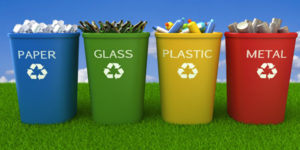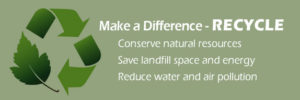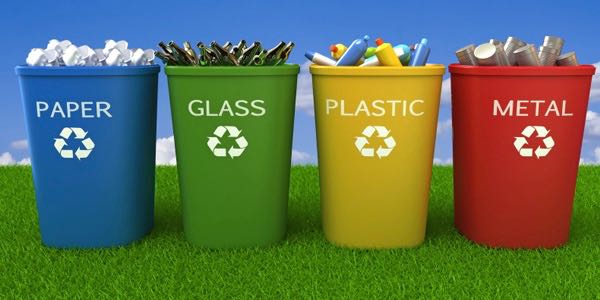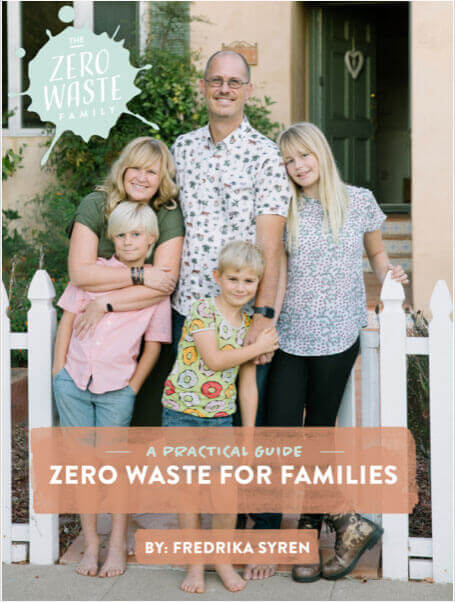By Larraine Roulston:
Utilizing timber, plastic, steel, aluminum and glass, as well as expensive metals that are found in electronic equipment, come at a cost to the earth and should be reused as many times as possible. As our planet’s resources are limited, recycling has become one of the many environmental efforts that we must do effectively. We feel good about recycling and this has resulted in a reasonably high participation rate. One of the problems, however, is that many well intentioned people include the wrong items. Mirrors and metal coat hangers are among things that do not belong in household recycling containers.
Recyclables placed in clear plastic bags may also cause problems in many regional processing facilities. Municipal public education on what and how to recycle is the key to allowing recycling plants to work efficiently and free of contamination.
Recycling provides jobs though education, collection, transportation, sorting, baling and marketing. It also has the potential to create many more jobs. At festivals or corporate events where massive amounts of waste are generated, extra staff can be hired to offer assistance at recycling stations to insure that participants deposit clean items correctly.
The process of recycling takes less energy to reproduce products than do those manufactured from virgin raw materials. One example — using recycled aluminum saves 95% of the energy that is used to make products from newly mined aluminum.
Mining and processing operations of metals cause pollution. Aluminum is 100% recyclable; and if it were all recovered, air pollutants, and contaminated water containing heavy metals and mine tailings would all be prevented.
By eliminating the amount of packaging and other items destined as trash, landfill space can be saved and landfill methane emissions reduced.
Recycling lowers greenhouse gas emissions. By recycling one ton of plastic, one ton of carbon dioxide is prevented from entering the atmosphere. Glass food containers are 100% recyclable without any loss in quality.
 Recycling preserves our natural resources. By recycling one ton of paper, 17 trees are saved. In addition, 380 gallons of oil; 7,000 gallons of water; three cubic yards of landfill space; and 4,000 kilowatts of energy are saved. With the high demand for paper, some timber originates from illegal cutting which adds to the destruction of the rain forest. With steel, recycling one metric ton saves 1,136 kg of iron ore; 454 kg of coal; and 18 kg of limestone.
Recycling preserves our natural resources. By recycling one ton of paper, 17 trees are saved. In addition, 380 gallons of oil; 7,000 gallons of water; three cubic yards of landfill space; and 4,000 kilowatts of energy are saved. With the high demand for paper, some timber originates from illegal cutting which adds to the destruction of the rain forest. With steel, recycling one metric ton saves 1,136 kg of iron ore; 454 kg of coal; and 18 kg of limestone.
This decade, citizens need to inquire about recycling efforts by local manufacturers, business offices, restaurants, retail outlets, hospitality sectors and institutions. All renovators should ensure that usable household fixtures be taken to Re-Stores and must strive to recycle as much debris as possible when demolishing existing structures.
Buy “recycled” to support the products and packaging that contain recycled content. Learn about moving toward the new circular economy! As we undergo cultural changes returning us to the principles of nature where nothing goes to waste, we should be mindful that recycling is essential.
Check out this video from a recycling center:
Related Links:
https://greentumble.com/why-is-recycling-important/
http://www.gpi.org/recycling/glass-recycling-facts
Recycling Facts — A Recycling Revolution
https://www.thebalance.com/plastic-recycling-facts-and-figures-2877886
http://greenliving.lovetoknow.com/Facts_About_Recycling_Paper
https://communityrecycleit.wordpress.com/2015/11/09/15-metal-recycling-facts/
Larraine writes the children’s book series on composting and pollinating. To order, visit www.castlecompost.com.











Amelia
Great article! So many pros of recycling and I don’t understand why all world still not make it mandatory?
Eli Richardson
It’s interesting to know how recycling saves energy while manufacturing products. Last week, one of my uncles mentioned he’d like to build a recycling program in his workplace, so I think he’d love to read your advice right now. Thank you for the information on why recycling uses fewer resources to manufacture.
Taylor Abrams
It’s incredible to learn that reducing the amount of packaging and other items that end up in landfills can save space and lower landfill methane emissions. I’m cleaning out our garage and found at least 3 units of old computers sitting in there unused and I think this article just gave me an idea about what to do with them. I will now go and find a computer recycling center that will take all these PCs out of my hand, thanks!
Lily Bridgers
It’s fascinating to learn how recycling reduces energy consumption during product production. I believe one of my uncles would love to read your suggestions right now because he indicated last week that he wants to build a garden shed using a 3/4″ Recycled Asphalt boulder. I like your explanation of why recycling requires fewer resources to produce and I’m sure he would too, thanks!
Olivia Smart
Thank you for explaining how recycling takes up less energy than it would to manufacture products from raw materials. I’ve been wondering how much recycling really impacts the environment. I hadn’t thought about this aspect before, but it definitely puts it into perspective.
Lily Bridgers
I appreciate you pointing out that recycling uses less energy than producing something from scratch would. I’ve been curious about the true environmental impact of recycling. This puts things into perspective in a way that I hadn’t previously considered, especially if businesses choose to use a scrap metal recycling pick-up service.
Elle Jones
It was interesting to hear how recycling lowers energy use in manufacturing. One of my uncles said last week that he wants to construct a garden shed utilizing a 3/4″ recycled asphalt boulder, therefore I think he would love to see your thoughts right now. He would probably agree with you that your explanation of why recycling uses fewer resources is great.